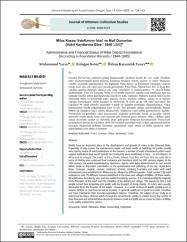| dc.contributor.author | Keleş, Erdoğan | |
| dc.contributor.author | Yazıcı, Muhammed | |
| dc.contributor.author | Karsandık Yazıcı, Özlem | |
| dc.date.accessioned | 2023-08-23T08:37:03Z | |
| dc.date.available | 2023-08-23T08:37:03Z | |
| dc.date.issued | 2022 | en_US |
| dc.identifier.citation | Yazıcı, M; Keleş, E; Yazızı, Ö. K. “Milas Kazası Vakıflarının İdarî ve Malî Durumları [Vakıf Kayıtlarına Göre / 1848-1885]". Osmanlı
Medeniyeti Araştırmaları Dergisi, 15 (2022): 134-163. | en_US |
| dc.identifier.issn | 24589519 | |
| dc.identifier.uri | https://dergipark.org.tr/tr/download/article-file/2556267 | |
| dc.identifier.uri | https://hdl.handle.net/20.500.12809/10913 | |
| dc.description.abstract | Wakfs have an important place in the development and growth of cities in the Ottoman State. Especially in city centers the maintenance, repair and basic needs of buildings for public benefit were met by means of wakf institutions. In this context, a number of wakf endowments which could support institutions that would benefit the community were established in kaza – or sub-district-of Milas and its villages. The wakfs of Firuz Pasha, Ahmed Gazi Bey and İlyas Bey are quite old in terms of history and continued their existence and functions until the 19th century. Again, in the 18th century, the wakfs established by Abdulaziz Aghas, who were administrators in and around Milas, made an important contribution to the amelioration and polishing of the city. Apart from these, mosques, masjids, zaviyes, madrasas, schools, drinking fountains and water well wakf endowments were established in Milas and its villages by different people. Total number 108 wakf institutions with 78 different names established in the town and villages of Milas. Of these wakfs, 99 wakfs were founded by men and nine wakfs founded by women. It is understood that the majority of the founders of the wakf were the notables of the district and village. The reason for this is that people turned their properties into wakfs with the thought of doing charity. Its rulers were usually descended from the founder of the wakfs. However, in a small number of wakfs, people such as imams, hafizes or muezzins served as trustees. In general, wakfs are in good economic condition and have maintained their income-expenditure balance. Therefore, the subject of our study is to determine the status of these wakfs through the record books (defters) created during the control of their financial and administrative structures between 1848 and 1885 and to reveal the place of Milas in the wafks endowment culture. | en_US |
| dc.item-language.iso | tur | en_US |
| dc.publisher | Selim Hilmi Ozkan | en_US |
| dc.relation.isversionof | 10.21021/osmed.1148480 | en_US |
| dc.item-rights | info:eu-repo/semantics/openAccess | en_US |
| dc.subject | Vakıf | en_US |
| dc.subject | Osmanlı | en_US |
| dc.subject | Milas | en_US |
| dc.subject | Muhasebe | en_US |
| dc.subject | Teftiş | en_US |
| dc.title | Milas Kazası Vakıflarının İdarî ve Malî Durumları [Vakıf Kayıtlarına Göre / 1848-1885] | en_US |
| dc.item-title.alternative | Administrative and Financial Status of Milas District Foundations [According to Foundation Records/1848-1885] | en_US |
| dc.item-type | article | en_US |
| dc.contributor.department | MÜ, Edebiyat Fakültesi, Tarih Bölümü | en_US |
| dc.contributor.authorID | 0000-0002-7260-2815 | en_US |
| dc.contributor.authorID | 0000-0003-3307-528X | en_US |
| dc.contributor.authorID | 0000-0003-4403-5734 | en_US |
| dc.contributor.institutionauthor | Keleş, Erdoğan | |
| dc.contributor.institutionauthor | Yazıcı, Muhammed | |
| dc.contributor.institutionauthor | Karsandık Yazıcı, Özlem | |
| dc.identifier.issue | 15 | en_US |
| dc.identifier.startpage | 134 | en_US |
| dc.identifier.endpage | 163 | en_US |
| dc.relation.journal | Osmanli Medeniyeti Arastirmalari Dergisi | en_US |
| dc.relation.publicationcategory | Makale - Uluslararası Hakemli Dergi - Kurum Öğretim Elemanı | en_US |


















